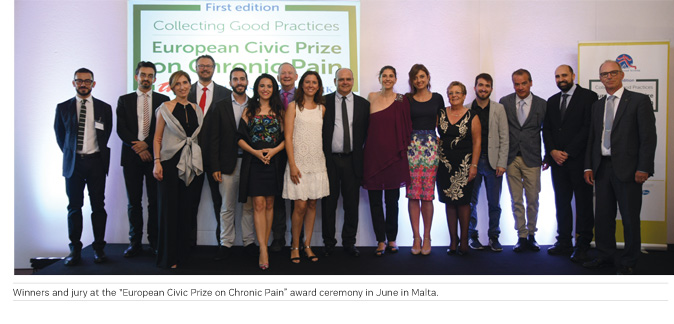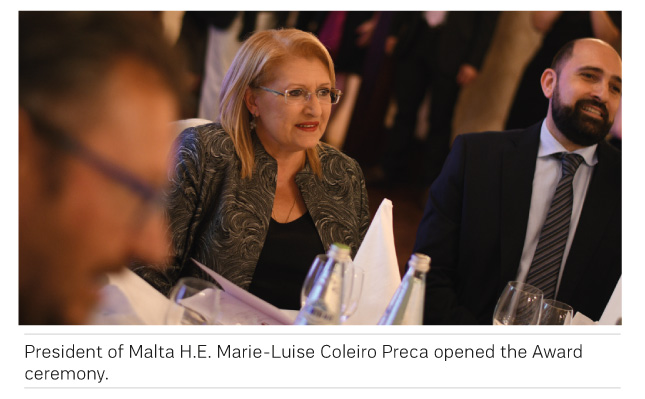HealthManagement, Volume 17 - Issue 3, 2017
The Active Citizenship Network has launched a prize for good practices in pain management with the aim of showcasing successful initiatives across Europe.
Four ground-breaking pain management initiatives have been recognised at an international event aimed at increasing awareness of the issue of patient pain and how to approach it effectively. The winners work in the categories of Clinical Practices, Patients’ Empowerment, Innovation and Professional Education.
Chronic pain affects around 20 percent of the adult population in Europe yet it remains poorly managed and under-treated, affecting not only patients, but also society at large. It results in more than 500 million sick days per year in Europe, costing the European economy more than €34 billion and is responsible for nearly half of all absences from work lasting more than three days in Europe.
Pain management employs an interdisciplinary approach for easing the suffering and improving the quality of life of those living with chronic pain. The typical pain management team includes medical practitioners, pharmacists, clinical psychologists, physiotherapists, occupational therapists, physician assistants, nurse practitioners and clinical nurse specialists. In 2014, for the first time at a European level, the issue of chronic pain was put on the agenda. It is of paramount importance that the public feels empowered to voice their support.
In 2015 after several years of work on this theme, the Active Citizenship Network (ACN), the European branch of the Italian NGO Cittadinanzattiva, started the first edition of the project known as “European Civic Prize on Chronic Pain - Collecting Good Practices", with the aim of providing evidence of existing good practices in the struggle against patient pain in several European countries.
The establishment of a “European Civic Prize on Chronic Pain”, based on the selection of the practices presented by different healthcare stakeholders (patients’ associations, health professionals, private and public hospitals and universities) provides an occasion for demonstrating what this community can offer in terms of experience which is useful in raising awareness about the condition, enhancing the body of knowledge of positive cases and success as well as strengthening commitment to this topic. This will be the first in a series of prizes awarded to celebrate progress in the treatment and management of chronic pain.
The project, realised with the support of Grünenthal GmbH and Pfizer Inc., gathered 30 ‘Good Practices’ on cancer and non-cancer-related chronic pain from 11 different countries: Malta (2); UK (6); Spain (8); Portugal (2); Ireland (1); Italy (6); Germany (1); Denmark (1); Finland (1); Netherlands (1) and Russia (1). These practices were collected and published. The principal contributors were, first of all, national and European patient associations then universities and both public and private hospitals.


The culmination of this activity, last February, was a panel, composed of chronic pain international experts representing universities, healthcare professionals, providers’ organisations and civic and patients’ associations, who selected the four winners of the prize.
The award ceremony was marked during the SIP - Societal Impact of Pain Symposium 2017 that was held in Malta in early June during the Maltese Presidency of the EU Council.
The Department of Physical Education and Sport, Faculty of Sport Sciences, University of Granada in Spain took the ‘Clinical Practices’ award. The project, named, "Physical activity in women with fibromyalgia: the al-Ándalus project" aimed to determine the role of physical activity on the development and treatment of fibromyalgia in female patients. A multidisciplinary team composed of Sport Scientists, Rheumatologists Psychologists, Physiotherapists, Occupational Therapists and Biologists handles the project. A total of 646 patients with fibromyalgia and 314 non-fibromyalgia individuals participated in the project.
You might also like: Patients' Rights Have No Borders
Beverly Collett, President of the Jury Panel, described the initiative as an “excellent well-organised collaborative project” that “incorporated sites outside of the traditional health care settings, such as private gyms and swimming pools and investigated a condition that is often neglected by healthcare professionals”.
The Alleanza Cefalalgici Cluster - European Headache Alliance in Italy took the prize for Patients’ Empowerment with its work on cluster headache (CH) patients. A list of seven recommendations, or “7 Commandments”, were devised by Expert Patients (EP ) for physicians engaged in the cluster headache management with the purpose of improving their ability to take care of the condition. These commandments were used as a guide to propose pragmatic, patient-centred changes in healthcare services dedicated to CH patients.
“This work showed great innovation in gathering together expert patients in four countries across Europe to assist healthcare practitioners in the management of Cluster Headaches” Collett said. “It is a very well thought out submission on an uncommon, but important, painful condition. It is good to see everyone working together to highlight this condition, which, if recognised should improve the management of patients with this condition and improve their quality of life”.
Collett described the winning project of the Innovation category as “truly innovative” and “very exciting”. Contributed from San Raffaele Hospital in Italy and entitled "Non-pharmacological treatment of chronic pain: a multimodal approach", the project objective was the definition of an innovative neuro-rehabilitative strategy helping patients with chronic neuropathic pain to regain a correct somatotopic sensibility using a multimodal approach. The team combined virtual reality with neuropsychological support and placed the patient at the core of a multidisciplinary team composed of neurologists, neuropsychologists, neurophysiologists, neurosurgeons and physiotherapists all working in close interaction to provide patients with a personalised rehabilitative strategy.
The winner in the category of Professional Education was The Pelvic Pain Support Network (PPSN ) in the UK. With a project named "Patients as Teachers in Health Professional Education", the PPSN charity has been delivering sessions on the Patient Perspective of pain to trainee doctors and nurses as part of the undergraduate curriculum at selected universities.
The objective of the work is to give the students the opportunity to learn about the personal experience of people with long-term pain regarding their encounters with health professionals. Patients, who are also experienced teachers, deliver the sessions giving students the opportunity to ask questions, delve deeper and thus gain insights at first-hand of the patient perspective.
“It’s excellent that the patient and a family member have been involved as this does emphasise the family impact of pain,” said Collett. “It shows good collaboration between patients, educators and clinicians”.
For ACN, it is crucial to gather and share good practices, identify priorities and recommendations and to ensure the commitment of the patient associations, professionals and healthcare institutions. At the same time, it is also fundamental to raise awareness, fight stigma and not only improve quality of life for people suffering from acute and severe chronic pain but also to reduce the socio-economic impact of chronic pain in Europe.
Building on this experience, ACN, along with the Spanish Foundation “Sine Dolore”, decided to promote the first civic Hub-incubator of best practices against pain across Europe: the “Pain Euro-Mediterranean Coalition”. This is effectively a platform for operators of good pain management practices.
The Coalition has the scientific support of the European Multidisciplinary Network in Pain, Research and Education/Efhre International University and 25 associations from ten countries have joined it.
The diversity of members within the coalition will strengthen collaborations among all the relevant stakeholders, thereby enriching European and national experiences, expertise, data and benchmarking on chronic pain.
Key Points
- Chronic pain affects around 20 percent of the adult
population in Europe yet it remains poorly managed and under-treated
- In 2014, the issue of chronic pain was put on the European
agenda for the first time
- In 2015, ACN started the project known as “European Civic
Prize on Chronic Pain - Collecting Good Practices"
- The project gathered 30 ‘Best Practices’ on cancer and
non-cancer-related chronic pain from 11 different countries
- ACN decided to promote the first civic Hub-incubator of best
practices against pain across Europe: the “Pain Euro-Mediterranean Coalition”



